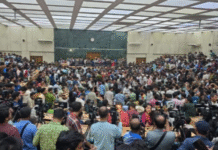ROHINGYA CRISIS
UNSC finds no quick, easy solution
Rohingyas seek justice
Shahidul Islam Chowdhury and Muhammad Nurul Islam in Cox’s Bazar | Apr 30,2018 | New Age

A Russian member of UN Security Council team answers the questions of journalists in a press briefing at the Kutupalong Refugee Camp in Cox’s Bazar on Sunday. — Reuters photo
The United Nations Security Council members on Sunday said they did not see any quick and easy solution to the protracted crisis on both sides of the border of Bangladesh and Myanmar.
Top diplomats of several UNSC member countries said this in a press conference after visiting Rohingya camps at Kutupalang in Cox’s Bazar.
Giving hints of less possibility of bringing and considering any resolution on Rohingya issues at the UNSC anytime soon, Sergey Kononuchenko, deputy permanent representative of Russian Federation, said, ‘It is not yet time for a resolution.’
‘There is no magic stick’, he said, insisting a bilateral mechanism between Bangladesh and Myanmar for a constructive solution.
During their visit, several thousand members, male, female and children of the Rohingya community flocked there. They described their protracted plights in Rakhine to the UNSC diplomats.
Rohingya leaders presented a memorandum to the UNSC delegation with a 13-point charter of demands for deploying peacekeeping forces, to establish a safe zone in Rakhine for facilitating their return to home with full citizenship without any discrimination under Rohingya ethnicity, freedom of movement, returning lands confiscated by the Myanmar authorities and making persons involved in persecution accountable.
Many youth were holding placards inscribed with their demands for regular citizenship of Myanmar and right to maintain their ethnicity as Rohingya, instead of Bengali.
They brought out a procession chanting slogans demanding justice for atrocities they faced in Rakhine when the UNSC team was leaving the Kutupalang camp after the press conference.
The Russian diplomat, however, stated that the UNSC, as a body, would keep eyes on the Rohingya crisis. ‘We are not walking away from the crisis,’ he assured.
The diplomats stressed that international community would require taking a united position with strong words for ensuring accountability of the persons involved in persecution against the Rohingyas in Rakhine State of Myanmar.
‘We understand what they (Rohingya) have faced before leaving home for an unknown destination,’ the UK’s permanent representative Karen Pierce said after talking to a group of female Rohingya victims at Kutupalang camp in Cox’s Bazar.
‘But the sad thing is,’ she said, ‘there is nothing we can do right today that will make their distress any less.’
China’s deputy permanent representative ambassador Wu Haitao said that the UN member countries required to work together as ‘there is no easy answer’ to the Rohingya crisis which was a ‘very complicated’ matter.
The United Kingdom’s permanent representative to the UN in New York Karen Pierce said solution to the Rohingya crisis ‘must be in Myanmar’ through repatriation to safety as the crisis was created in Myanmar.
Leader of the UN Security Council delegation and also Peru’s permanent representative to the UN headquarters in New York Gustavo Meza-Cuadra said that they came to see the situation on the ground [on both sides of the border] to find out ways how the council could cooperate in ensuring safe and voluntary return of Rohingyas to Rakhine State.
Describing the Rohingya crisis as a humanitarian catastrophe, Mansour Al-Otaibi of Kuwait said the Rohingya issues would remain a priority of the UNSC with less possibility of considering a sanction [on Myanmar] anytime soon.
He hoped that Myanmar would comply with international laws and uphold its commitment to humanitarian conventions for a speedy solution to the crisis.
When asked about the role of the UNSC in ensuring accountability of the persons involved in persecution against Rohingya community, Joanna Wronecka of Poland, who would be the UNSC chair for May, said role of the international community ‘is crucial’ as ‘we have to agree for a united position with strong words.’
Putting emphasis on keeping the Rohingya situation in focus by the UNSC, Kairat Umarov of Kazakhstan said, ‘We are not on a pleasure trip [in Bangladesh, Myanmar].’
Top diplomats to the UN of the US, France, Bolivia, Equatorial Guinea, Ethiopia, the Netherlands and Sweden were also participants in the 40-member delegation that interacted with Rohingyas at zero-line of the Bangladesh-Myanmar border and makeshift camps in Cox’s Bazar.
A delegation from Cox’s Bazar Civil Society and NGO Forum also handed over a memorandum to the visiting UNSC delegation.
Poland’s permanent representative to the UNSC Joanna Wronecks received the memorandum from CCNF led by co-chair Abu Morshed Chowdhury.
The CCNF demanded, in the memorandum, UNSC steps to make persons involved in ethnic cleansing accountable to the International Court of Justice, resolution in UNSC to impose embargo on trade and arm business in Mayanmar, to set up an environmental recovery fund for Cox’s Bazar for the remarkable losses of natural resources, including forest, hills and water that made local people vulnerable.
State minister for foreign affairs M Shahriar Alam and acting foreign secretary M Khurshed Alam and senior Bangladesh diplomats accompanied the UNSC delegation to the camps.
The UNSC delegation would call on prime minister Sheikh Hasina before leaving Dhaka for Myanmar’s capital Naypayitaw on Monday. The UNSC delegation would visit Rakhine State.
The Security Council discussed the Rohingya issue on several occasions at its headquarters without producing any substantive step for stopping atrocities against Rohingyas as, experts believed, China and Russia were active behind the scenes discouraging efforts to move resolutions against the Myanmar authorities.
About 7,00,000 Rohingyas, mostly women, children and aged people, entered Bangladesh fleeing unbridled murder, arson and rape during ‘security operations’ by Myanmar military in Rakhine, what the United Nations denounced as ethnic cleansing, since August 25, 2017.
The ongoing Rohingya influx took the number of undocumented Myanmar nationals and registered refugees in Bangladesh to over 11,00,000, according to estimates by UN agencies and Bangladesh foreign ministry.
The two governments signed three instruments since November 23, 2017, for return of forcibly displaced Myanmar nationals sheltered in Bangladesh after October 2016, as the Rohingya exodus from Rakhine State continued.









